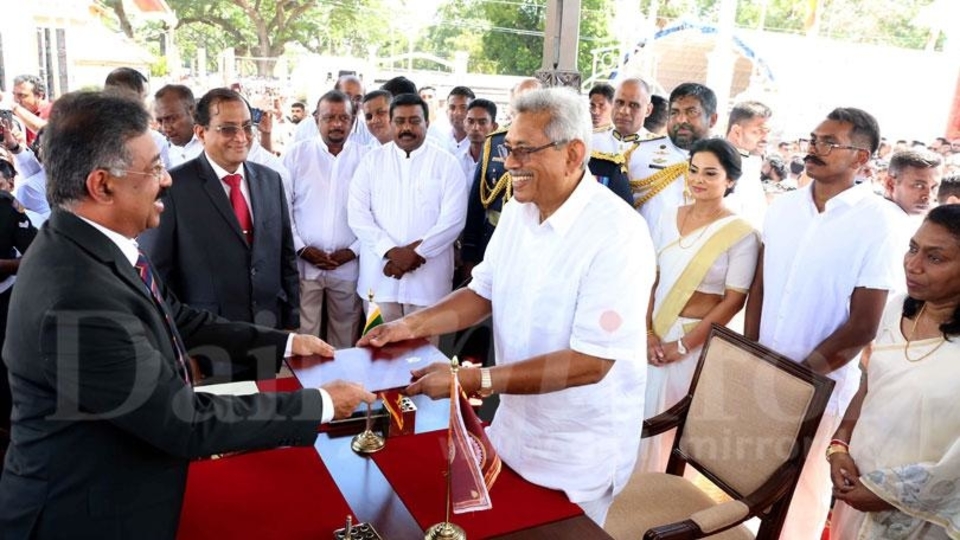Gotabaya Rajapaksa, younger brother of former Sri Lankan president Mahinda Rajapaksa, was sworn in as the country’s new president on Monday, November 18. Rajapaksa secured a clear mandate with 52.25% of the votes, defeating the ruling United National Party candidate Sajith Premadasa. The results came as a surprise, particularly for candidates who had launched a “third force” in the elections. According to election commission officials, the turnout for the elections was impressive with over an 80% participation rate.
The appointment of Gotabaya has, however, led to a widening of the pre-existing ethnic divide between the Sinhalese and Tamils in the country. Rajapaksa has not been popular with the minority Tamil and Muslim communities, concentrated in the northern and eastern part of the country, who overwhelmingly voted against him. On the other hand, the Buddhist Sinhalese, who form 70% of the total population, have largely thrown their weight behind him.
In fact, in his first address to the nation, Gotabaya made it clear that he was aware that his victory was made possible only by the majority Sinhala votes. “But I asked Tamils and Muslims to be a part of my success. Their response was not what I expected,” he added.
Gotabaya is the first military officer to assume the presidential office of Sri Lanka. Previously, he served as the defense secretary under the presidency of Mahinda Rajapaksa, between 2005 to 2014. Under his watch, the Sri Lankan military allegedly killed around 40,000 Tamils during the final stage of 2009 civil war. Hundreds of thousands were also displaced. These figures were later testified by various United Nations reports.
Gotabaya’s previous record of cracking down on dissent by arresting and subjecting journalists and activists to enforced disappearances, and the accusations of widespread human rights violations against him, have left a large percentage of Tamil voters, as well as the progressive sections in the country, disgusted with the election results.
Last month, on being questioned about the calls for an investigation into his role in the alleged crimes committed against the Tamil community in northern Sri Lanka during the civil war, the former lieutenant replied, “why talk about past all of the time… let’s talk about the future.”
“Fear of polarization”
Gotabaya is backed by the Rajapaksa loyalists – the Sri Lanka Freedom Party and the Sinhale Buddhist monks who openly supported his campaign in a bid to gain greater control over the minority communities in the country. While his election manifesto largely spoke about prioritizing economic and security reforms, thus appealing to the masses, another pertinent issue within it was the focus on centralization of power. Sri Lanka presently has a semi-presidential form of government, wherein the prime minister, the president and the cabinet share executive authority.
During the presidential oath taking ceremony held at the ancient Ruwanweli Seya Buddhist temple, Gotabaya claimed that he was conscious that he was also president to “all those who used to vote against” him, seemingly appealing to the minorities. However, with the powerful Buddhist clergy extending explicit support to Gotabaya, a dangerous precedent has been set, further polarizing the political and ethnic divide within the country – particularly between the northern Tamil areas and Sinhalese dominated southern parts of Sri Lanka.
The failure of the previous government to prevent the Easter attacks on churches and hotels in Colombo, on April 21, also played a critical role in shaping public opinion in his favor. The coordinated bomb blasts caused 269 deaths.
Through strong statements on curbing terrorism, besides the need for strengthening the overall surveillance network and rebuilding the intelligence and security arms of the state, Gotabaya has capitalized on the trust deficit within the Sinhalese population. However, this renewed sense of nationalism has rang the alarm bells for the 10% Muslim minorities, who remains vulnerable and have, in the recent past, faced persistent harassment at the hands of the state security apparatus.
Meanwhile, former president Mahinda Rajapaksa has said in a statement that, “The first task of the newly appointed government would be to review 19 amendment of the constitution.” Adopted in 2016, this legislation envisaged the dilution of executive presidency power, and reintroduced the presidential term limit of two years.
It is expected that Gotabaya will appoint his elder brother as the prime minister of the country once the incumbent Ranil Wickremesinghe steps down. Wickrenesinghe, on November 20, handed in his resignation after meeting the President Gotabaya.
While reconciliation and accommodation are the need of the hour, in a country that has seen years of turmoil and civil war, the current election results have evidently exposed the fault lines within Sri Lankan society. How far the ethnic divide and the memories of violence will impact the country’s future, will only become clear once the newly elected government unfolds its economic and governance reforms.





